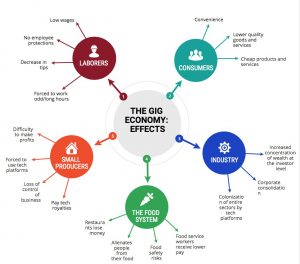Written by Ellie Lauderback
Fall 2017
I began my internship with the Sustainable Economies Law Center (SELC) simply wanting to learn more about food policy, without a specific project in mind. SELC is a small group of lawyers and activists who work to create a more equitable and just economy through the lenses of food, housing, energy, and labor, via policy advocacy, legal advice, research and education. What started out as me assisting my supervisor, Christina Oatfield, with an array of diverse, small tasks, later became a wholehearted investigation into homemade food policy in California and its future in the state. This project has not only allowed me to learn about the policy itself but has also forced me to consider the widespread consequences of the growing tech industry and gig economy, both in terms of homemade food and other economies.
The Problem
The gig economy, also known as the sharing economy, is a labor market that relies on the employment of independent contractors or freelancers for short-term contracts rather than permanent formal employment. In recent times, we have seen the rise of the gig economy facilitated by the growth of the technology sector. Dependence on the gig economy is built into the business models of many well-known tech companies, including Uber, Lyft, AirBnb, PostMates, and GrubHub, as these companies solely employ contracted workers to supply their services (whether they be food delivery, transportation, or lodging), which are marketed and sold via online platforms. Reliance on gig economy labor has significantly impacted both the contracted workers themselves and the businesses partnered with these tech companies.
The issues of the gig economy are intertwined with issues in the food system, most recently in regards to homemade food policy in California. The California Homemade Food Act (AB1616) was passed in 2012 in part due to the efforts of SELC and allows for “non potentially toxic” foods to be sold out of home kitchens without requirements for an industrial kitchen. This law marks great opportunities for small food producers to legally sell their products, contributing to the formal economy and adding to the financial security of home cooks. The current law only includes foods that are low risk in terms of food safety, such as baked goods, preserves, candies, and many more, and now the goal of multiple stakeholders is to expand the law to hot meals as well.
On one hand, the expansion of this law could be an incredible victory for home cooks, giving them an opportunity to run legitimate food businesses selling a wide range of items. However, one of the biggest proponents of the expansion of this law happens to be an online tech platform that is currently operating illegally, marketing home cooked meals for pickup at individual cooks’ homes. While the current law has no provisions for tech platforms, the new bill backed by the tech platform is engineered with their platform in mind and makes provisions specific to their business model. In many ways tech platforms can seem to be purely beneficial to society, but in reality they have widespread ramifications on laborers, small produces, industry, and the food system. Throughout my internship, I was able to explore these ramifications in other sectors, specifically in ride-sharing and food delivery, and apply them to the homemade food economy. Below is an infographic demonstrating the range of effects the gig economy has had on various stakeholders.
In order to garner support for our position on homemade food, Christina and I have been developing a website as a source of information regarding California homemade food policy, and have reached out to food-related groups across the state. Through these efforts, we hope to make legislators think critically about both the costs and benefits of tech involvement in the homemade food economy before making major policy decisions about homemade food.
My Experience
Researching and writing about the gig economy for Christina was both an incredibly eye-opening and challenging experience. How was I to explain these complex issues in a manner that would not only be understandable to other people, but also motivate them to look past the allures of the tech industry? Since I have been working on this project, I have discussed it with many people - friends, family, and classmates - many times encountering disinterest and disbelief, a challenge we have also faced in garnering support for our position within the food system. I had not known the extent of the effects of the gig economy before coming to SELC, but I now am wary of the role of technology in our society. How do we balance technology and remain connected to our humanity? Overall, this experience challenged me to write content that could effectively explain controversial material and convince people to think about it. My work on homemade food policy has made me more aware of the dynamics of our economy, allowing me to be a more educated consumer going forward.

